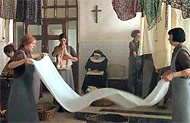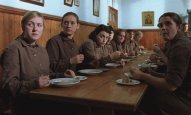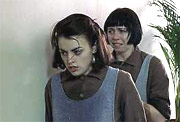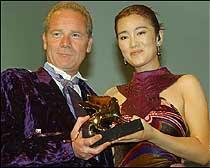Lion of the Scandal, Lion of the Courage: Venice Film Festival awards Peter Mullan's The Magdalene Sisters
by Anna Battista
Sophia, Sophia and Sophia. That's what was on Italian TV and newspapers when the 2002 Venice Film Festival opened: a bland Mrs. Loren arriving at the Lido to present the movie Between Strangers, directed by her son Edoardo Ponti. In a rush of motherly love and undivided affection, Sophia, after managing to obscure the screening of Julie Taymor's Frida, behaved like a cross between the average Italian mother, constantly glued to her son, and a Mafia woman, constantly glued to her boss. Though out of the main competition (fortunately, otherwise it would have won thanks to Sophia's powerful connections ), there was more hype about Between Strangers than about the films running for the prestigious Golden Lion. So, the first day of the Festival passed in praise of Ponti's movie, a film that had not even been screened yet, and from the press, people only learnt that yes, it was true, Sophia had finally found a perfect-tailored role for her, designed by her son, and she had finally discovered the best director who had ever directed her, her son.
Then the second day of the festival arrived, a day in which critics were waiting for Steven Soderbergh's Full Frontal with great expectations and anticipation. But someone also happened to mention that at the Lido another director was arriving, the Scottish Peter Mullan. Better known for having directed the film Orphans, praised at the Venice Film Festival in 1998 by the critics (who during the International Critics Week competition awarded it with four prizes), and for having starred as the main actor in Ken Loach's My Name Is Joe, Mullan was this time going to present to the Venice audience his latest film, The Magdalene Sisters. Since nobody had seen it and nobody knew what it was about, the only thing said about the film was that - scandal! - there was also an ex-nun starring in it. More and more gossips about Sophia followed, gossips eventually suffocated by the rumours that in Soderbergh's film there was David Duchovny naked. Then, the day after there was a massive shock.
 The most discussed movie wasn't Between Strangers, nor Full Frontal:
both had indeed bored their audiences. Everybody was talking about Peter
Mullan's The Magdalene Sisters, starring Geraldine McEwan, Anne-Marie
Duff, Nora-Jane Noone, Dorothy Duffy, Eileen Walsh and Phyllis McMahon. The
film focuses on the so-called Magdalene Asylums, proper laundries scattered
all over the UK and Ireland and run by nuns, in which unmarried women who
had given birth to babies, women who had led unchaste lives or who were
simply too beautiful and therefore easy prey of temptation, were interred
and obliged to expiate their sins by working for 364 days a year without
being paid. The last Magdalene convent closed in 1996, since, by then, the
washing machine could easily be found in every house and, consequently, the
job of these "lost women" was useless.
The most discussed movie wasn't Between Strangers, nor Full Frontal:
both had indeed bored their audiences. Everybody was talking about Peter
Mullan's The Magdalene Sisters, starring Geraldine McEwan, Anne-Marie
Duff, Nora-Jane Noone, Dorothy Duffy, Eileen Walsh and Phyllis McMahon. The
film focuses on the so-called Magdalene Asylums, proper laundries scattered
all over the UK and Ireland and run by nuns, in which unmarried women who
had given birth to babies, women who had led unchaste lives or who were
simply too beautiful and therefore easy prey of temptation, were interred
and obliged to expiate their sins by working for 364 days a year without
being paid. The last Magdalene convent closed in 1996, since, by then, the
washing machine could easily be found in every house and, consequently, the
job of these "lost women" was useless.
 Mullan's The Magdalene Sisters is set in Ireland in 1964 and tells the
story of four of these girls, Margaret, Bernadette, Rose and Crispina, who
have to expiate their "sins" in a Magdalene Asylum that is actually a
proper prison rather than a convent. Starting with the story of Margaret,
raped by her cousin and consigned to a Magdalene asylum as punishment for
"having been raped," the movie explores the psychological and physical
tortures to which the girls were submitted to by the Sisters of Mercy, who
are portrayed as greedy and evil prison guards. Beaten, their heads shaven,
deprived of their rights, humiliatingly exposed and laughed at in a cruel
game, the girls of The Magdalene Sisters win all the same over the
injustices of the nuns who hypocritically cry at the Tinseltown Sister
Benedict played by Ingrid Bergman in The Bells of St. Mary's, but do not
show any pity in real life.
Mullan's The Magdalene Sisters is set in Ireland in 1964 and tells the
story of four of these girls, Margaret, Bernadette, Rose and Crispina, who
have to expiate their "sins" in a Magdalene Asylum that is actually a
proper prison rather than a convent. Starting with the story of Margaret,
raped by her cousin and consigned to a Magdalene asylum as punishment for
"having been raped," the movie explores the psychological and physical
tortures to which the girls were submitted to by the Sisters of Mercy, who
are portrayed as greedy and evil prison guards. Beaten, their heads shaven,
deprived of their rights, humiliatingly exposed and laughed at in a cruel
game, the girls of The Magdalene Sisters win all the same over the
injustices of the nuns who hypocritically cry at the Tinseltown Sister
Benedict played by Ingrid Bergman in The Bells of St. Mary's, but do not
show any pity in real life.
 The day after the movie was screened, the critics divided in two factions,
those who supported the movie and those who attacked it and claimed it was
a scandalous and anti-clerical film. "Ridiculous and infamous" proclaimed a
critic from the pages of the Catholic newspaper L'Avvenire; "angry and
rancorous provocation" the newspaper L'Osservatore Romano added, while only
one of the national Italian TV channels (the one less influenced by the
puppeteer of the Italian media, Prime Minister Silvio Berlusconi, and by
his centre-right wing government), dared to screen two whole minutes of the
film trailer and a whole minute of interview with Mullan. The other
channels simply ignored the movie. More negative comments were expressed
by the clergy led by cardinal Tonini, who wondered if what was shown in the
film had really happened and wasn't a fantasy conjured up by Mullan.
The day after the movie was screened, the critics divided in two factions,
those who supported the movie and those who attacked it and claimed it was
a scandalous and anti-clerical film. "Ridiculous and infamous" proclaimed a
critic from the pages of the Catholic newspaper L'Avvenire; "angry and
rancorous provocation" the newspaper L'Osservatore Romano added, while only
one of the national Italian TV channels (the one less influenced by the
puppeteer of the Italian media, Prime Minister Silvio Berlusconi, and by
his centre-right wing government), dared to screen two whole minutes of the
film trailer and a whole minute of interview with Mullan. The other
channels simply ignored the movie. More negative comments were expressed
by the clergy led by cardinal Tonini, who wondered if what was shown in the
film had really happened and wasn't a fantasy conjured up by Mullan.
The fuss and fret over The Magdalene Sisters and its director Peter Mullan, condemned by the Catholic critics and by the Italian clergy for having compared the Catholic Church to the Taliban in an interview, continued for a couple of days after the screening, then suddenly stopped and the festival went on. Soon, the attention moved onto Harrison Ford, John Malkovich, Tom Hanks and the other stars of the festival. More criticism followed the day 11' 09" 01, a collective movie about 11th September 2001 directed by Yussef Chahine, Amos Gitai, Shohei Imamura, Alejandro Gonzalez Iñarritu, Claude Lelouch, Ken Loach (who was later given the Fipresci Prize, awarded by the jury of the international press, for his shortcut in "11' 09"01"), Samira Makhmalbaf, Mira Nair, Idrissa Ouedrago, Sean Penn and Danis Tanovic, was screened and consequently attacked as anti-American. The umpteenth angry debate followed till the day of the awarding ceremony arrived.
The list of prizes awarded to the various films was long: the Luigi De Laurentiis award for a first film was given to Spiro Scimone and Francesco Sframeli's Two Friends and to Dylan Kidd's Roger Dodger who came equal first; the San Marco prize went to Springtime in a Small Town, directed by Tian Zhuang Zhuang; the best shortcut was awarded to Irina Efteeva for Clown; best actor was proclaimed Stefano Accorsi who starred in the Italian movie A Voyage Called Love by Michele Placido, whereas Julianne Moore was awarded best actress for Far From Heaven, directed by Todd Haynes; best director went to Lee Chang-dong for Oasis and a special recognition of the jury was granted to the House of Fools by Russian director Andrej Konchalovsky. Then beautiful Gong Li, the president of the international jury composed of Jacques Audiard, Evgenij Evtusenko, Ulrich Felsberg, László Kovács, Francesca Neri and Yesim Ustaoglu, was invited to announce the winner of the Golden Lion and she, timidly, but firmly, proclaimed "The Magdalene Sisters by Peter Mullan!".
 On his way to the
stage, Mullan, who was wearing a blue kilt and matching violet jacket that
literally drove crazy a lot of photographers and journalists, turned
towards the jury, looked at them and cheerily clapped his hands to thank
the members. While cradling the prize in his arms, Mullan explained, "When
I was young I saw Ponticelli's The Battle of Algiers and I always
remember that when it opened it said 'Winner of the Golden Lion in Venice'.
And Battle of Algiers has always been one of my favourite films. So, to
have achieved this prize is one of the greatest honours for me. For what
regards the film, it is not just about the Catholic Church and how they
oppressed young women in Ireland, but it's about all faiths, all
fundamentalist faiths that think they have a right to oppress young women."
On his way to the
stage, Mullan, who was wearing a blue kilt and matching violet jacket that
literally drove crazy a lot of photographers and journalists, turned
towards the jury, looked at them and cheerily clapped his hands to thank
the members. While cradling the prize in his arms, Mullan explained, "When
I was young I saw Ponticelli's The Battle of Algiers and I always
remember that when it opened it said 'Winner of the Golden Lion in Venice'.
And Battle of Algiers has always been one of my favourite films. So, to
have achieved this prize is one of the greatest honours for me. For what
regards the film, it is not just about the Catholic Church and how they
oppressed young women in Ireland, but it's about all faiths, all
fundamentalist faiths that think they have a right to oppress young women."
Little did Mullan suspect that, while he was fondly holding in his hands his beloved award and while Nobel Prize Dario Fo was leading a furious battle outside of the theatre room since the host presenting the Awards hadn't even mentioned that, after the ceremony, Fo's cartoon Johan Padan was going to be screened, another fundamentalist movement was going to be formed, this time against him and his movie. Valerio Riva, adviser of the board of directors of the Venice Biennale, who called Mullan's film a "feuilleton", was already on a war footing and practically wanted the prize back, after all it was too scandalous to give the Golden Lion to such an anti-Catholic movie. Besides, the president of the Italian Performing Arts Institution, Ente dello Spettacolo, joined in, claiming the jury had been influenced by the critics who had supported The Magdalene Sisters, adding that he found inconvenient the fact that a festival organised under the patronage of a centre-right wing government would give a prize to an anticlerical movie (an amazing observation that led the country to believe that perhaps the jury had been asked by the board to favour another film, but, in the end, the panel had democratically awarded the "real" best film).
Luckily, Moritz de Hadeln, director of the film festival, who praised the international jury for their work, underlined how the people who saw the movie didn't agree with such nasty remarks, adding that perhaps also the Pope should say he's sorry for what happened in the Magdalene convents. "I really hope that young women will see this film and realise that if they can free themselves in their minds, then they can start to fight back," Mullan added at the end of his speech, right after he got the prize.
Indeed, Mullan's victory is a victory for the "Magdalene girls", a victory for truth revealed, a victory deserved for an amazingly shocking movie that will surely remain stuck in people' s minds for quite a while. But The Magdalene Sisters represents also a victory over any attempt that might have come from the government aides at influencing the jury. Next year, perhaps, if this government is still in charge, they will be free to have another festival director and another jury, both more keen to be plagiarised and to elect a movie less brave and rebellious than Mullan's. Meanwhile, The Magdalene Sisters, hailed by the Vatican Radio as "unpleasant and offensive" and severely attacked a week after the Venice Golden Lion by cardinal Ruini, has also won the Volkswagen Discovery Award at the Toronto Film Festival and is officially out in Italy where all the debates about it have only caused massive queues outside the local cinemas. Time for Peter Mullan to thank his "devoted" opponents at the Vatican then.
Copyright (c) 2005 erasing clouds |
|